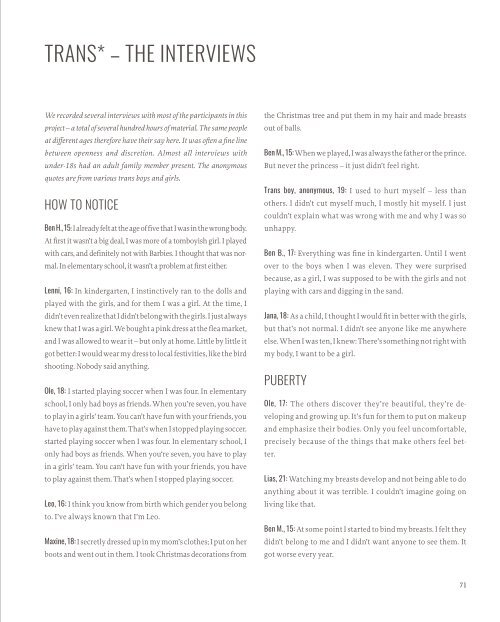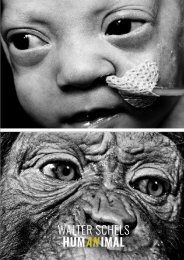Walter Schels. trans* | Magazin (Blick ins Buch)
Über mehrere Jahre begleitete Walter Schels junge Menschen, die sich als Mädchen empfinden, aber in einem Jungenkörper geboren wurden und umgekehrt. Schels' Porträts machen den schwierigen Prozess des Einswerdens mit sich selbst sichtbar. In Interviews berichten die Transmädchen und Jungen von Selbstablehnung und Selbstfindung, von Solidarität und Ausgrenzung, Freundschaft und Mobbing, von Erfahrungen mit Eltern, Geschwistern und der ersten Liebe. Redaktion: Beate Lakotta Sprachen: Deutsch, Englisch Format: 22,5 x 28 cm Hochwertiger Schwarzweiß-Digitaldruck auf Volumenpapier Softcover, Fadenbindung 104 Seiten
Über mehrere Jahre begleitete Walter Schels junge Menschen, die sich als Mädchen empfinden, aber in einem Jungenkörper geboren wurden und umgekehrt. Schels' Porträts machen den schwierigen Prozess des Einswerdens mit sich selbst sichtbar.
In Interviews berichten die Transmädchen und Jungen von Selbstablehnung und Selbstfindung, von Solidarität und Ausgrenzung, Freundschaft und Mobbing, von Erfahrungen mit Eltern, Geschwistern und der ersten Liebe.
Redaktion: Beate Lakotta
Sprachen: Deutsch, Englisch
Format: 22,5 x 28 cm
Hochwertiger Schwarzweiß-Digitaldruck auf Volumenpapier
Softcover, Fadenbindung
104 Seiten
- No tags were found...
You also want an ePaper? Increase the reach of your titles
YUMPU automatically turns print PDFs into web optimized ePapers that Google loves.
TRANS* – THE INTERVIEWS<br />
We recorded several interviews with most of the participants in this<br />
project – a total of several hundred hours of material. The same people<br />
at different ages therefore have their say here. It was often a fine line<br />
between openness and discretion. Almost all interviews with<br />
under-18s had an adult family member present. The anonymous<br />
quotes are from various trans boys and girls.<br />
HOW TO NOTICE<br />
Ben H., 15: I already felt at the age of five that I was in the wrong body.<br />
At first it wasn’t a big deal, I was more of a tomboyish girl. I played<br />
with cars, and definitely not with Barbies. I thought that was normal.<br />
In elementary school, it wasn’t a problem at first either.<br />
Lenni, 16: In kindergarten, I <strong>ins</strong>tinctively ran to the dolls and<br />
played with the girls, and for them I was a girl. At the time, I<br />
didn’t even realize that I didn’t belong with the girls. I just always<br />
knew that I was a girl. We bought a pink dress at the flea market,<br />
and I was allowed to wear it – but only at home. Little by little it<br />
got better: I would wear my dress to local festivities, like the bird<br />
shooting. Nobody said anything.<br />
Ole, 18: I started playing soccer when I was four. In elementary<br />
school, I only had boys as friends. When you’re seven, you have<br />
to play in a girls’ team. You can’t have fun with your friends, you<br />
have to play aga<strong>ins</strong>t them. That’s when I stopped playing soccer.<br />
started playing soccer when I was four. In elementary school, I<br />
only had boys as friends. When you‘re seven, you have to play<br />
in a girls’ team. You can‘t have fun with your friends, you have<br />
to play aga<strong>ins</strong>t them. That’s when I stopped playing soccer.<br />
Leo, 16: I think you know from birth which gender you belong<br />
to. I’ve always known that I’m Leo.<br />
Maxine, 18: I secretly dressed up in my mom’s clothes; I put on her<br />
boots and went out in them. I took Christmas decorations from<br />
the Christmas tree and put them in my hair and made breasts<br />
out of balls.<br />
Ben M., 15: When we played, I was always the father or the prince.<br />
But never the princess – it just didn’t feel right.<br />
Trans boy, anonymous, 19: I used to hurt myself – less than<br />
others. I didn’t cut myself much, I mostly hit myself. I just<br />
couldn’t explain what was wrong with me and why I was so<br />
unhappy.<br />
Ben B., 17: Everything was fine in kindergarten. Until I went<br />
over to the boys when I was eleven. They were surprised<br />
because, as a girl, I was supposed to be with the girls and not<br />
playing with cars and digging in the sand.<br />
Jana, 18: As a child, I thought I would fit in better with the girls,<br />
but that’s not normal. I didn’t see anyone like me anywhere<br />
else. When I was ten, I knew: There’s something not right with<br />
my body, I want to be a girl.<br />
PUBERTY<br />
Ole, 17: The others discover they’re beautiful, they’re developing<br />
and growing up. It’s fun for them to put on makeup<br />
and emphasize their bodies. Only you feel uncomfortable,<br />
precisely because of the things that make others feel better.<br />
Lias, 21: Watching my breasts develop and not being able to do<br />
anything about it was terrible. I couldn’t imagine going on<br />
living like that.<br />
Ben M., 15: At some point I started to bind my breasts. I felt they<br />
didn’t belong to me and I didn’t want anyone to see them. It<br />
got worse every year.<br />
71








